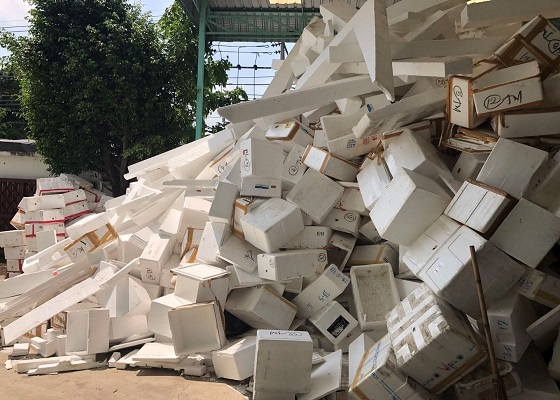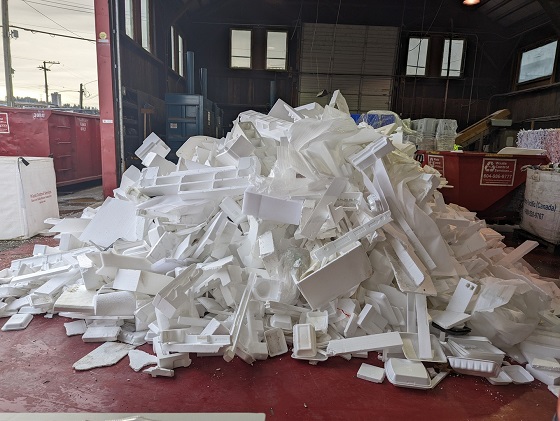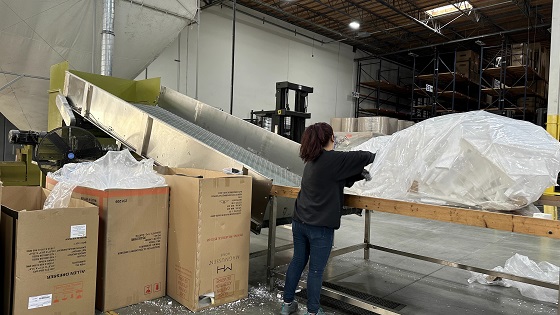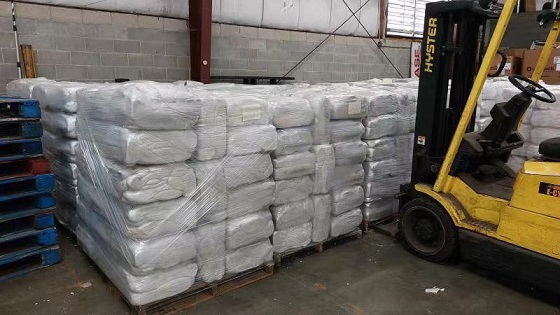Effective Polystyrene Recycling in the White Goods Industry: A Comprehensive Guide
The white goods industry—comprising large household appliances such as refrigerators, washing machines, dishwashers, and air conditioners—has long been a major contributor to waste production. Among the various materials used in these products, expanded polystyrene (EPS) stands out as a key element in packaging and insulation. However, with growing environmental concerns over the accumulation of non-biodegradable waste, effective recycling solutions are needed more than ever. In this practical guide, we explore how polystyrene recycling can help reduce waste in the white goods industry, with a particular focus on the role of GREENMAX polystyrene recycling machines.

Why Is Polystyrene Commonly Used in White Goods?
Polystyrene is widely used in the white goods industry primarily for packaging and insulation. Its light weight, ease of molding, and cost-effectiveness make it a popular choice. EPS foam, a form of expanded polystyrene, is often used to protect appliances during transportation and handling. It is also used as insulation material in appliances like refrigerators and freezers, where it helps to maintain energy efficiency.
However, EPS foam poses a serious environmental challenge. As a non-biodegradable material, EPS can take hundreds of years to decompose. If not properly recycled, it often ends up in landfills or contributes to oceanic plastic pollution.
The Importance of Polystyrene Recycling in the White Goods Industry
Recycling polystyrene is crucial for reducing the environmental footprint of the white goods industry. The material, while lightweight, is bulky, taking up a significant amount of space in landfills. Proper recycling not only reduces waste but also turns polystyrene into valuable resources that can be reused in manufacturing.
The recycling of EPS foam is particularly important in the white goods sector, given the volume of packaging and insulation waste produced. Every year, millions of tons of EPS foam are used to protect and insulate appliances. By adopting effective recycling solutions, the industry can significantly reduce its contribution to plastic pollution while promoting sustainability and a circular economy.

GREENMAX Polystyrene Recycling Machines: A Solution for the White Goods Industry
One of the most effective ways to manage EPS waste in the white goods industry is through the use of advanced recycling technology. GREENMAX, a leader in the field of EPS recycling, offers a range of machines that can help businesses in the white goods sector reduce their environmental impact.
The GREENMAX polystyrene recycling machines are designed to efficiently compress and recycle EPS foam, which is often the most challenging material to recycle due to its low density. By using a combination of heat and pressure, these machines melt the foam down, reducing its volume by up to 90%. This process not only makes it more cost-effective to store and transport the foam but also results in high-density EPS ingots that can be reused in the manufacturing of new products.

Key Benefits of GREENMAX EPS Recycling Machines:
Efficiency: GREENMAX machines can handle large volumes of EPS waste, making them ideal for the high-output white goods industry.
Cost-Effective: By reducing the volume of EPS foam, the machines help to minimize transportation and storage costs.
Environmental Impact: By recycling EPS foam into valuable materials, these machines help reduce the amount of waste going to landfills and promote a circular economy.
Versatility: The recycled EPS ingots produced by GREENMAX machines can be used in a wide range of applications, from new packaging to insulation materials and even new foam products.
How Does the Recycling Process Work?
The recycling process begins with the collection of used polystyrene from packaging and appliances. Once the EPS foam is gathered, it is fed into the GREENMAX machine, which uses a combination of compression and heating to melt the foam down. The foam is then transformed into high-density ingots, which are compact and easy to store and transport. These ingots can be sent to manufacturers who will reuse them to create new products, thus completing the recycling loop.
The GREENMAX machines offer a closed-loop solution that is ideal for the white goods industry. By recycling EPS foam into reusable materials, manufacturers can not only reduce their waste output but also lower their reliance on virgin materials, making their operations more sustainable.

The Future of Polystyrene Recycling in the White Goods Industry
The white goods industry is increasingly under pressure to adopt sustainable practices, particularly in relation to packaging and insulation. The demand for green manufacturing practices is growing, and recycling EPS foam is a critical step toward meeting these expectations.
GREENMAX polystyrene recycling machines are helping businesses in the white goods sector make significant strides in waste reduction. As the technology continues to evolve, it is likely that more companies will adopt these machines to ensure they meet environmental standards and contribute to a circular economy.
Conclusion
Polystyrene recycling is a crucial component of sustainability in the white goods industry. With the introduction of advanced recycling technologies like the GREENMAX polystyrene recycling machines, businesses can significantly reduce their environmental impact while reusing valuable materials. By adopting these systems, the white goods industry can lead the way in transforming waste into resources, paving the way for a greener, more sustainable future.
